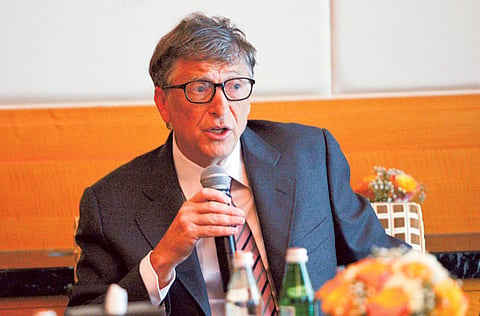UAE donates $249m to Gates Foundation projects
Gates says $5.5b needed to achieve zero-polio status worldwide

Dubai: The UAE has donated $249 million to projects done in collaboration with the Bill and Melinda Gates Foundation up to date, the man himself said at a media roundtable event in Dubai’s Ritz Carlton Hotel.
Bill Gates, Co-chair of the Bill and Melinda Gates Foundation is currently visiting the region to discuss Polio eradication efforts and explore opportunities to support other global health and development priorities with regional leaders and partners.
“In addition to the UAE’s resource commitment, the UAE has been extremely helpful in carrying the message of vaccination,” said Gates.
Assistance made by the UAE includes a $50 million contribution by the UAE Government made in 2011, and another $120 million contribution personally made by General Shaikh Mohammad Bin Zayed Al Nahyan, Crown Prince of Abu Dhabi and Deputy Supreme Commander of the UAE Armed Forces.
“There was a neutral commitment made in 2011 where the Gates foundation gave $50 million and the UAE government gave $50 million. Two-thirds was for vaccination and one third was specifically for polio, which was used over a three-year period,” said Gates.
Currently, new discussions are apart of the dialogue taking place between the Gates foundation and UAE government officials to further work on the cause.
A number of partnerships with organisations such as Dubai Cares and the Khalifa Fund have also contributed to humanitarian projects led by the Gates foundation focusing on neglected diseases and nutrition.
“Every country in the world should want polio to be eradicated because every child is at risk as long as we still have polio in the world,” explained Gates.
The commitment to end polio world wide by the Gates foundation and numerous international health organisations, governments and individuals aims to reach a goal of polio eradication by 2018. Gates highlighted that despite challenges and recent outbreaks in Syria and Iraq, a total of $5.5 billion is still the budget needed to achieve that goal in the next four years.
Referring to the growing refugee crisis in northwestern Pakistan, Gates explained that the situation will result in hundreds of new cases of polio.
“In the short run, it’s going to cause more cases but the only good news is that kids are moving to other areas like Peshawar or parts of Afghanistan where we are able to go in and access them and get them the vaccines.” He confirmed that the situation does not have to be a long term setback even though the number of polio cases will tragically increase.
Pakistan along with Afghanistan and Nigeria are the only three countries where polio remains endemic.
While confident that the world will achieve a zero polio status in 2018, Gates pointed out that eradicating Malaria will be the next world project.
Recalling the world’s first failed attempt to eradicate malaria in 1955, Gates said that the foundation is spending billions of dollars on science in order to create new drugs, vaccines and ways to kill mosquitos to gradually reach their goal. Gates pointed out that while the eradication of malaria will be more challenging than polio, he is hopeful that a 10- to 15-year plan will be enough time to reach zero malaria status worldwide. Malaria is currently killing half a billion people worldwide a year, mostly in Africa and some in Asia in countries such as Yemen. “I know it doesn’t always seem like this to most people, but the world is actually getting better all the time. The data shows that clearly. In most places, child mortality is declining, and poverty is falling. Our partners in the Middle East are crucial to that change,” he said.



